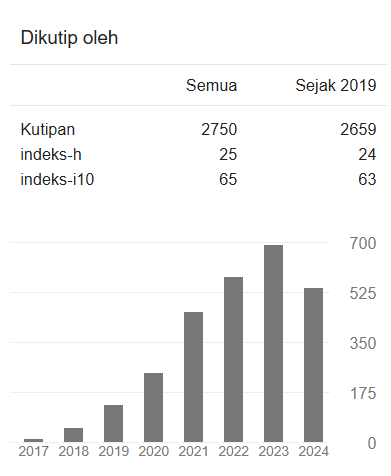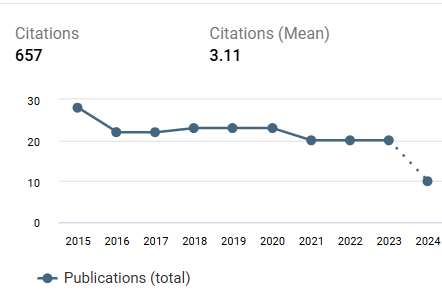Developing EFL teachers’ competence in designing learning materials through electronic English book design training
DOI:
https://doi.org/10.22219/jinop.v9i2.25287Keywords:
EFL teachers’ book, teacher competence, trainingAbstract
This study aims to develop the competence of teachers in designing English learning materials through electronic English book design training. This study was action research. The training was given to 7 English teachers at the Madrasah Tsanawiyah level (Islamic junior high school) with more than 5 years of teaching experience and proficiency in using computers. Data were collected by using product assessment, observation, and interviews. The data was analyzed by using descriptive qualitative analysis. The results show that teachers can create electronic books for English learning after receiving learning technology training with training materials including: (1) designing materials through PowerPoint, (2) changing materials in electronic form through I-spring, and (3) making electronic books with the android extension via APK builder. Indicators of the teacher’s competence in designing electronic books include: (1) being able to independently design the content in terms of explanation materials in the form of images, audio, and video and exercises in the form of quizzes equipped with assessments and (2) being able to independently design the appearance or layout of an electronic book consisting of cover, layout, and buttons.
Downloads
References
Bikowski, D., & Casal, J. E. (2018). Interactive digital textbooks and engagement: A learning strategies framework, Language Learning & Technology, 22(1), 119-136. http://dx.doi.org/10125/44584
Bluestein, S. A., & Kim, T. (2017) Expectations and fulfilment of course engagement, gained skills, and non-academic usage of college students utilizing tablets in an undergraduate skills course, Education and Information Technologies, 22(4), 1757–1770. https://doi.org/10.1007/s10639-016-9515-8
Chen, M., Zhou, C., Meng, C., & Wu, D. (2019). How to promote Chinese primary and secondary school teachers to use ICT to develop high-quality teaching activities. Educational Technology Research and Development, 67, 1593-1611. https://doi.org/10.1007/s11423-019-09677-0
Cozart, D. L., Horan, E. M., & Frome, G. (2021). Rethinking the traditional textbook: A case for Open Educational Resources (OER) and no-cost learning materials. Teaching & Learning Inquiry, 9(2), 1-17. https://files.eric.ed.gov/fulltext/EJ1314747.pdf
Dobler, E. (2015). E‐textbooks A personalized learning experience or a digital distraction. Journal of adolescent & adult literacy, 58(6), 482-491. https://doi.org/10.1002/jaal.391
Elias, T. (2011). 71. Universal instructional design principles for mobile learning. International Review of Research in Open and Distribute Learning, International Review of Research in Open and Distance Learning, 12(2), 143–156. https://doi.org/10.19173/irrodl.v12i2.965
Gu, X., Wu, B., & Xu, X. (2015). Design, development, and learning in e-Textbooks: what we learned and where we are going. Journal of Computers in Education, 2, 25-41. https://doi.org/10.1007/s40692-014-0023-9
Hartell, E., Gumaelius, L., & Svärdh, J. (2015). Investigating technology teachers’ self-efficacy on assessment, International Journal of Technology and Design Education, 25(3), 321–337. https://doi.org/10.1007/s10798-014-9285-9
Hurley, T. A., & Fekrazad, A. (2020). E-textbooks, inclusive access, and academic performance. Inclusive access and open educational resources e-text programs in higher education, 177-184. https://doi.org/10.1007/978-3-030-45730-3_15
Johnson, R. B., & Christensen, L. (2017). Educational Research: Quantitative, Qualitative, and Mixed Approaches. USA: SAGE Publications, Inc.
Joo, Y. J., Park, S., & Shin, E. K. (2017). Students' expectation, satisfaction, and continuance intention to use digital textbooks. Computers in Human Behavior, 69, 83-90. https://doi.org/10.1016/j.chb.2016.12.025
Lai, G., Zhu, Z., & Williams, D. (2017). Enhance Students’ Learning in Business Statistics Class Using Video Tutorials, Journal of Teaching and Learning with Technology, 6(1), 31–44. https://doi.org/10.14434/jotlt.v6.n1.21161
Lawrence, J. E., & Tar, U. A. (2018). Factors that influence teachers’ adoption and integration of ICT in teaching/learning process, Educational Media International, 55(1), 79–105. https://doi.org/10.1080/09523987.2018.1439712
Li, J. (2016). The transmission of cultural values via EFL textbooks in China, Journal of Educational Media, Memory, and Society, 8(2), 128–144. https://doi.org/10.3167/jemms.2016.080207
Marleni, L., & Asilestari, P. (2019). Developing social media-based textbook for speaking class in English study program, JEES (Journal of English Educators Society), 4(1), 31–38. https://doi.org/10.21070/jees.v4i1.1764
Moiseenko, O., Akinshina, I. B., Zimovets, N. V., Shemaeva, E. V., & Markov, A. V. (2019). Contemporary foreign language teacher’s training, International Journal of Higher Education, 8(7), 95–101. https://doi.org/10.5430/ijhe.v8n7p95
Moundy, K., Chafiq, N. & Talbi, M. (2022). A Model for scripting and designing a digital textbook, International Journal of Emerging Technologies in Learning, 17(21), 296–311. https://doi.org/10.3991/ijet.v17i21.34603
Murray, K., Berking, P., Haag, J., & Hruska, N. (2012). Mobile learning and ADL’s experience API, Connections, 12(1), 45–49. https://www.jstor.org/stable/26326313
Nasir, A. R., & Bargstädt, H. J., (2017). An approach to develop video tutorials for construction tasks, Procedia Engineering, 196(June), 1088–1097. https://doi.org/10.1016/j.proeng.2017.08.066
Nasution, J. A., Suhaili, N. & Alizamar, A. (2017). Motif siswa memiliki smartphone dan penggunaannya, JPPI (Jurnal Penelitian Pendidikan Indonesia), 3(2), 15–29. https://doi.org/10.29210/02017114
Oder, T., & Eisenschmidt, E. (2018). Teachers’ perceptions of school climate as an indicator of their beliefs of effective teaching. Cambridge Journal of Education, 48(1), 3-20. http://dx.doi.org/10.1080/0305764X.2016.1223837
Putra, A. A., & Wahyuni, I. W. (2021). Pengaruh penggunaan handphone pada siswa sekolah dasar, Al-Hikmah: Jurnal Agama dan Ilmu Pengetahuan, 18(1), 79–89. https://doi.org/10.25299/al-hikmah:jaip.2021.vol18(1).6531
Rahayuningsih, R., & Zede, V. A. (2019). The effect of handphone and learning motivation on learning achievement of English students, Adhum: Jurnal Penelitian dan Pengembangan Ilmu Administrasi dan Humaniora, 9(2), 69–72. https://jurnal.ummi.ac.id/index.php/JAD/article/view/707
Rashid, I., Yasin, I., & Saleem, A. (2019). ITC: Computers, software, and internet a land mark in the history of education sector. International Journal of Computer Science and Technology, 3(3), 7-27. http://ijcst.com.pk/index.php/IJCST/article/view/197/156
Rohmani, R., Apriza, B., & Mahendra, Y. (2021). Pengembangan gim kuis edukasi suplemen buku ajar pengantar dasar IPA berbasis website. JINoP (Jurnal Inovasi Pembelajaran), 7(2), 194-208. https://doi.org/10.22219/jinop.v7i2.18576
Setyono, B., & Widodo, H. P. (2019). The representation of multicultural values in the Indonesian Ministry of Education and Culture-Endorsed EFL textbook: a critical discourse analysis. Intercultural Education, 30(4), 383-397. https://doi.org/10.1080/14675986.2019.1548102
Shelton, C. (2017). Giving up technology and social media: why university lecturers stop using technology in teaching, Technology, Pedagogy and Education, 26(3), 303–321. https://doi.org/10.1080/1475939X.2016.1217269
Siew-Eng, L., & Muuk, M. A. (2015). Blended learning in teaching secondary schools’ English: A Preparation for tertiary science education in Malaysia, Procedia - Social and Behavioral Sciences, 167, 293–300. https://doi.org/10.1016/j.sbspro.2014.12.677
Sun, J., Flores, J., & Tanguma, J. (2012). E‐Textbooks and students’ learning experiences. Decision Sciences Journal of Innovative Education, 10(1), 63-77. https://doi.org/10.1111/j.1540-4609.2011.00329.x
Sung, Y. T., Chang, K. E., & Liu, T. C. (2016). The effects of integrating mobile devices with teaching and learning on students' learning performance: A meta-analysis and research synthesis. Computers & Education, 94, 252-275. https://doi.org/10.1016/j.compedu.2015.11.008
Susanto, R., Rachmadtullah, R., & Rachbini, W. (2020). Technological and pedagogical models: Analysis of factors and measurement of learning outcomes in education, Journal of Ethnic and Cultural Studies, 7(2), 1–14. https://doi.org/10.29333/ejecs/311
Taimalu, M., & Luik, P. (2019). The impact of beliefs and knowledge on the integration of technology among teacher educators: A path analysis. Teaching and Teacher Education, 79, 101-110. https://doi.org/10.1016/j.tate.2018.12.012
Thunman, E., & Persson, M. (2013). Teachers’ access to and use of ICT: an indicator of growing inequity in Swedish schools. Contemporary Educational Technology, 4(3), 155-171. https://dergipark.org.tr/en/pub/cet/issue/25733/271485
Tondeur, J., Van Braak, J., Ertmer, P. A., & Ottenbreit-Leftwich, A. (2017). Understanding the relationship between teachers’ pedagogical beliefs and technology use in education: a systematic review of qualitative evidence. Educational technology research and development, 65, 555-575. https://doi.org/10.1007/s11423-016-9481-2
Van der Meij, H., & Van der Meij, J. (2016). The effects of reviews in video tutorials, Journal of Computer Assisted Learning, 32(4), 332–344. https://doi.org/10.1111/jcal.12136
Ying-chen, L. M., & Kinzie, M. B. (2000). Computer technology training for prospective teachers : Computer attitudes and perceived self-efficacy. Journal of Technology and Teacher Education, 8(4), 373–396. https://www.learntechlib.org/p/8044
Downloads
Published
How to Cite
Issue
Section
License
Copyright (c) 2023 Usman et al

This work is licensed under a Creative Commons Attribution 4.0 International License.
Copyright Notice
Authors who publish with JINoP (Jurnal Inoasi Pembelajaran) agree to the following terms:
- For all articles published in the JINoP (Jurnal Inovasi Pembelajaran), copyright is retained by the authors. Authors give permission to the publisher to announce the work with conditions. When the manuscript is accepted for publication, the authors agree to the automatic transfer of the publishing right to the publisher.
- Authors retain copyright and grant the journal the right of first publication with the work simultaneously licensed under a Creative Commons Attribution 4.0 International License. that allows others to share the work with an acknowledgment of the work's authorship and initial publication in this journal.
- Authors are able to enter into separate, additional contractual arrangements for the non-exclusive distribution of the journal's published version of the work (e.g., post it to an institutional repository or publish it in a book), with an acknowledgment of its initial publication in this journal.
- Authors are permitted and encouraged to post their work online (e.g., in institutional repositories or on their website) prior to and during the submission process, as it can lead to productive exchanges, as well as earlier and greater citation of published work (See The Effect of Open Access).








